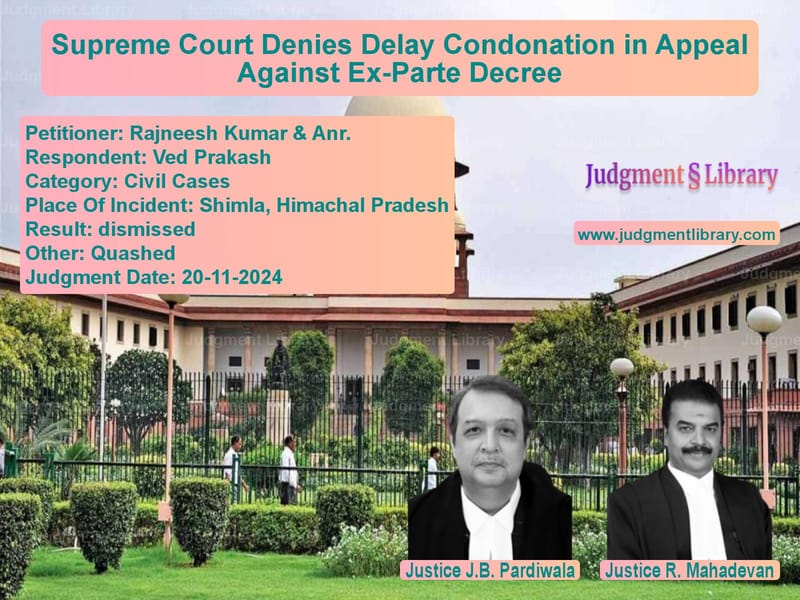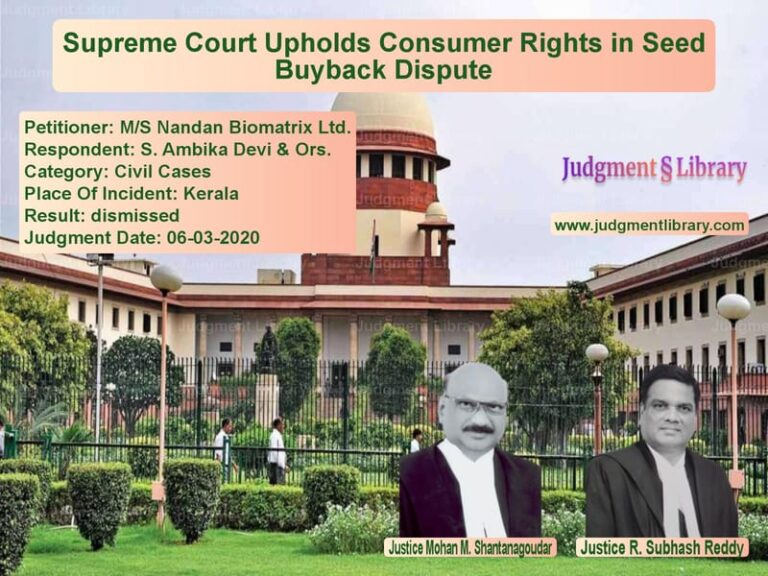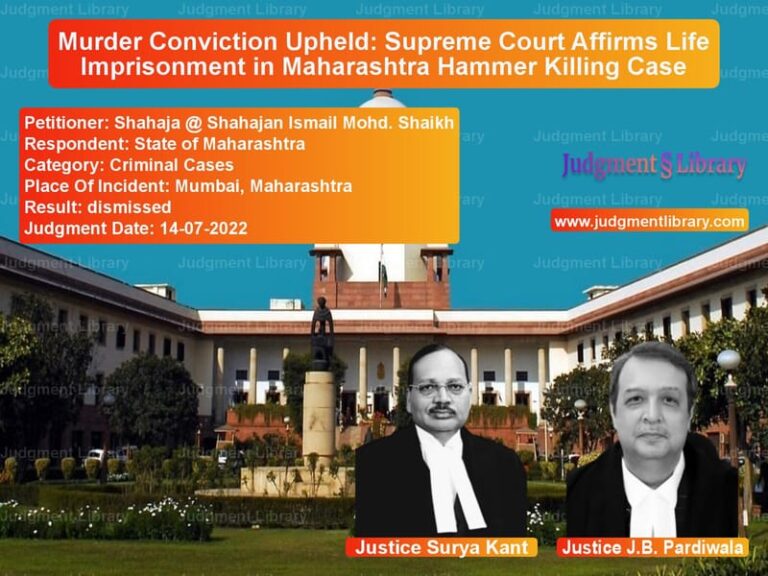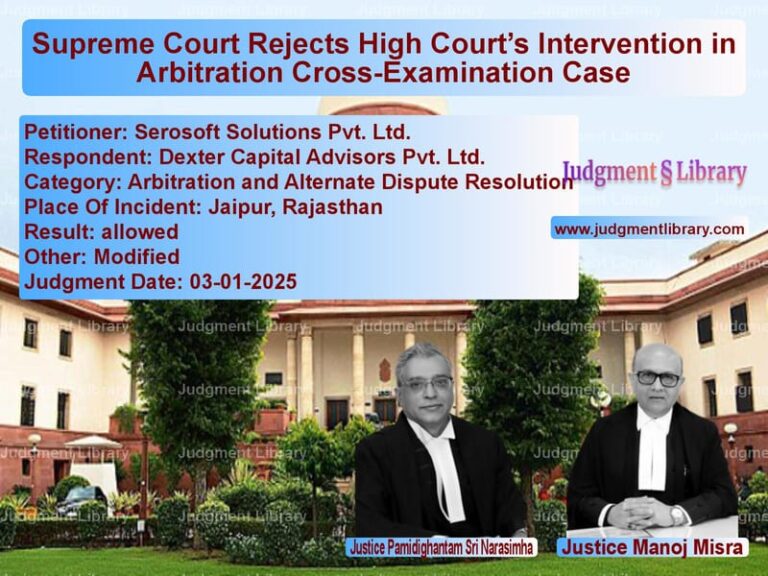Supreme Court Denies Delay Condonation in Appeal Against Ex-Parte Decree
The case of Rajneesh Kumar & Anr. vs. Ved Prakash deals with the issue of delay condonation in filing an appeal against an ex-parte decree. The Supreme Court of India, in its judgment dated November 21, 2024, dismissed the petition, holding that litigants cannot escape responsibility by solely blaming their legal counsel for negligence.
Background of the Case
The dispute originated when the petitioners, Rajneesh Kumar and another, filed a civil suit against Ved Prakash. During the proceedings, Ved Prakash filed a counterclaim. The main suit filed by the petitioners was dismissed for default, and their subsequent application for restoration was also dismissed. However, the trial court allowed the counterclaim, passing an ex-parte decree in favor of Ved Prakash on January 17, 2015.
Over 534 days later, the petitioners filed an appeal challenging the ex-parte decree. The first appellate court condoned the delay, reasoning that litigants should not suffer due to the negligence of their advocate. However, Ved Prakash challenged this condonation before the High Court of Himachal Pradesh.
Legal Issues
- Whether the delay of 534 days in filing the appeal should have been condoned.
- Whether the litigants could blame their advocate’s negligence as the sole reason for the delay.
- Whether the petitioners had deliberately suppressed facts regarding their knowledge of the counterclaim proceedings.
Petitioner’s Arguments
The petitioners contended that:
- The delay was due to the negligence of their former advocate, who failed to inform them about the ex-parte decree in the counterclaim.
- Their application for restoration of the dismissed suit indicated their willingness to pursue legal recourse, and they were unaware that the counterclaim had been decided.
- The first appellate court correctly condoned the delay to ensure justice.
Respondent’s Arguments
The respondent, Ved Prakash, argued that:
- The petitioners were aware of the counterclaim proceedings as early as March 22, 2012, but deliberately concealed this fact.
- The delay was not due to mere negligence but was a deliberate attempt to misuse legal procedures.
- They had ample opportunity to challenge the decree within the limitation period but failed to act.
- The first appellate court wrongly condoned the delay without considering the deliberate suppression of facts.
Supreme Court’s Observations
The Supreme Court examined the facts and legal precedents and made the following key observations:
1. Responsibility of the Litigant
The Court emphasized that litigants cannot entirely shift the blame to their advocate. It cited Salil Dutta v. T.M. & M.C. Private Ltd. (1993), where it was held:
“The advocate is the agent of the party. His acts and statements, made within the limits of authority given to him, are the acts and statements of the principal. There is no absolute rule that a party can disown its advocate at any time and seek relief.”
2. Suppression of Material Facts
The Court found that the petitioners had knowledge of the counterclaim proceedings but deliberately concealed this information. The High Court had rightly observed:
“Since the respondents had not approached the Court with clean hands and have rather suppressed material facts, no indulgence much less discretion could have been exercised in favor of the petitioners.”
3. Importance of the Law of Limitation
The Court reiterated that limitation laws exist to ensure timely legal action. It cited Bharat Barrel & Drum MFG Co. v. Employees State Insurance Corporation (1971):
“The necessity for enacting periods of limitation is to ensure that actions are commenced within a particular period. The law does not assist a person who is inactive and sleeps over his rights.”
Final Judgment
The Supreme Court upheld the High Court’s decision and ruled:
- The appeal was time-barred, and the delay was unjustified.
- The first appellate court erred in condoning the delay based on advocate negligence.
- Litigants must be vigilant in pursuing their legal rights and cannot indefinitely delay justice.
- The Special Leave Petitions (SLP) were dismissed.
Impact of the Judgment
This ruling reinforces the principle that litigants must actively pursue their cases and cannot rely on advocate negligence as an excuse for excessive delay. The judgment:
- Strengthens judicial discipline by preventing misuse of delay condonation provisions.
- Upholds the importance of procedural diligence in legal proceedings.
- Ensures that limitation laws serve their intended purpose of maintaining efficiency in the judicial system.
By rejecting the petitioners’ plea, the Supreme Court has reaffirmed that the legal system will not entertain cases where delay is a result of deliberate negligence or suppression of facts.
Petitioner Name: Rajneesh Kumar & Anr..Respondent Name: Ved Prakash.Judgment By: Justice J.B. Pardiwala, Justice R. Mahadevan.Place Of Incident: Shimla, Himachal Pradesh.Judgment Date: 20-11-2024.
Don’t miss out on the full details! Download the complete judgment in PDF format below and gain valuable insights instantly!
Download Judgment: rajneesh-kumar-&-anr-vs-ved-prakash-supreme-court-of-india-judgment-dated-20-11-2024.pdf
Directly Download Judgment: Directly download this Judgment
See all petitions in Damages and Compensation
See all petitions in Contract Disputes
See all petitions in Legal Malpractice
See all petitions in Judgment by J.B. Pardiwala
See all petitions in Judgment by R. Mahadevan
See all petitions in dismissed
See all petitions in Quashed
See all petitions in supreme court of India judgments November 2024
See all petitions in 2024 judgments
See all posts in Civil Cases Category
See all allowed petitions in Civil Cases Category
See all Dismissed petitions in Civil Cases Category
See all partially allowed petitions in Civil Cases Category







